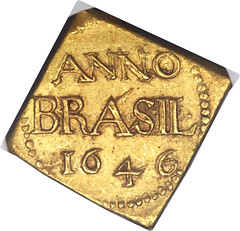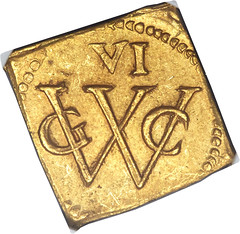
PREV ARTICLE
NEXT ARTICLE
FULL ISSUE
PREV FULL ISSUE
1646 DUTCH COLONIAL BRAZIL SIEGE COIN
I'm a sucker for interesting emergency money, and siege coins are among my favorite. This piece caught my eye in the March 19, 2016
email newsletter from Heritage Auctions. -Editor
 
Our upcoming April 14-19 CICF World Coins & Ancient Coins Signature Auction in Chicago features an extremely rare 1646 6 Guilders issue from the Geoctroyeede West-Indische Compagnie in Brazil. The strike is crude, as with all the Pernambuco gold issues, but all of the legends, denomination, and date are full and bold. At MS62, as graded by NGC, this is a nice Mint State example of this elusive series. The Dutch invaded the northeast coast of Brazil in 1630 with the intention of establishing a colonial presence in South America. For the initial 2 years, the Dutch remained cornered in "Fort Orange" and under constant attack by the Portuguese. The Geoctroyeede West-Indische Compagnie (GWC), a company created by the Dutch to "manage" their operations in Pernambuco, was considering abandoning Brazil all together when in 1632 when the Portuguese commander, Domingos Ferreira Calabar defected from the Portuguese army and joined the Dutch. With Calabar, the Dutch expanded their position north of Pernambuco adding several important towns on their way. The Dutch troops consisted mostly of mercenary soldiers there simply to fight than money. At this time, mostly Hispanic American and Portuguese coins circulated in Dutch Brazil. The Dutch brought their own money, the Guilder, which by the mid 1640's was extremely scarce and when the galleon "Zeeland" ported in the city of Recife, with gold from the Dutch post in Guinee, Africa, the GWC took a "share" of the precious metal. The company was near a desperate state, constantly cornered and under attack, and used the gold taken from the "Zeeland" to strike in September of 1645, three denominations; 3, 6 and 12 Guilders. There are no records of the exact numbers of coins that were struck in 1645 but scholars estimate between 1500 and 2000 of each denomination. The important fact is that coins struck in Brazil were not legal tender in Holland and any coins coming back to Europe had to be exchanged for Dutch Guilders (and this is why the Brazilian issue was referred to as the Brazilian Ducat) and subsequently were melted. In the colony, any Portuguese or Brazilian found with a Dutch coin ran the risk of being considered a traitor and hanged. So any coins staying behind in Brazil would have been melted after 1654 after the Dutch were finally ousted from South America. The fact is that very few coins remain of both dates and all three denominations. Our best estimate would be around 50-60 pieces, all together, and a number in museum collections. To read the complete lot description, see:
Wayne Homren, Editor The Numismatic Bibliomania Society is a non-profit organization promoting numismatic literature. See our web site at coinbooks.org. To submit items for publication in The E-Sylum, write to the Editor at this address: whomren@gmail.com To subscribe go to: https://my.binhost.com/lists/listinfo/esylum All Rights Reserved. NBS Home Page Contact the NBS webmaster 
|